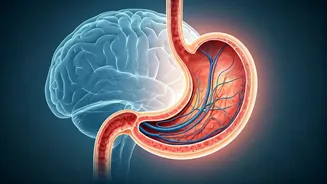Brain-Gut Connection Explained
The brain and the gut communicate bidirectionally, forming what is often referred to as the brain-gut axis. This axis allows these two seemingly separate
systems to constantly interact. The gut, also known as the enteric nervous system, is often called the "second brain" because it contains millions of neurons that can operate independently. When anxiety surges, the brain triggers the release of stress hormones, like cortisol and adrenaline. These hormones can disrupt the normal functioning of the digestive system. They might speed up or slow down digestion, increase gut sensitivity, or alter the composition of gut bacteria. The gut, in turn, can send signals back to the brain. For instance, an irritated gut can trigger anxiety, creating a vicious cycle. Understanding this intricate interplay is the first step toward managing the effects of anxiety on digestion.
Anxiety's Digestive Impact
Anxiety presents itself differently in various individuals, yet it often manifests in a spectrum of digestive issues. Some people experience accelerated digestion, resulting in diarrhea or frequent bowel movements, driven by the body's 'fight or flight' response. Others may encounter the opposite issue: constipation, as the digestive process slows down. Moreover, anxiety can increase the sensitivity of the gut, causing bloating, gas, and abdominal pain. The gut bacteria, vital for digestive health and overall wellbeing, can also be negatively affected. Anxiety can shift the balance of these bacteria, potentially leading to inflammation and digestive discomfort. Prolonged anxiety can lead to a state of chronic gut inflammation, contributing to conditions like Irritable Bowel Syndrome (IBS) or exacerbating pre-existing digestive problems. Recognising these specific impacts is vital to identifying the underlying source of your digestive distress.
Diet and Gut Health
What you consume directly affects gut health and can exacerbate or alleviate anxiety-related digestive issues. Some foods are known to worsen digestive symptoms. Highly processed foods, high in sugar and unhealthy fats, can promote inflammation and disrupt the gut microbiome. Caffeine and alcohol can also irritate the gut, increasing anxiety levels and digestive distress. On the other hand, certain foods can support gut health. Fiber-rich foods like fruits, vegetables, and whole grains, promote regular bowel movements and feed beneficial gut bacteria. Probiotic-rich foods such as yogurt and fermented foods can also introduce beneficial bacteria into the gut. A well-balanced diet that emphasizes whole, unprocessed foods is a key part of managing the brain-gut connection. It is important to note that changes in diet should be done gradually to avoid further digestive disturbances. Consult with a healthcare professional to identify your specific dietary needs.
Stress Management Techniques
Effectively managing anxiety is fundamental to improving digestive health. There are many strategies that can help. Mindfulness practices, such as meditation and deep breathing exercises, can calm the nervous system and reduce the stress response. Regular exercise is also beneficial, as it releases endorphins, which have mood-boosting effects. Activities like yoga and tai chi integrate movement with mindfulness, which is especially helpful for stress reduction. Cognitive Behavioral Therapy (CBT) can assist in identifying and modifying negative thought patterns that contribute to anxiety. Establishing a consistent sleep schedule and ensuring adequate rest is equally important, as sleep deprivation can worsen anxiety and exacerbate digestive issues. Seeking professional support from therapists or counselors can provide guidance and tools for managing anxiety effectively. Incorporating these stress-reduction techniques into your daily life can positively impact both your mental state and digestive health.
Lifestyle Adjustments
Besides diet and stress management, specific lifestyle changes can contribute to a healthier brain-gut connection. Stay well-hydrated, as dehydration can affect digestive functions, worsening anxiety. Consider incorporating regular mealtimes to regulate the digestive system. Additionally, ensure you take time to eat your meals slowly, allowing for adequate digestion. Limiting exposure to environmental stressors, such as constant news or social media, can reduce anxiety. Building a strong support network of friends and family can provide emotional support during stressful times. Prioritize activities that bring joy and relaxation into your life. Engaging in hobbies, spending time in nature, or pursuing creative outlets can help reduce stress levels and improve your overall well-being. Consistently implementing these lifestyle adjustments can significantly improve the connection between your brain and gut, leading to enhanced digestive comfort.
When to Seek Help
While lifestyle changes and self-care practices can often mitigate anxiety-related digestive problems, it's essential to recognize when professional help is necessary. If digestive symptoms are severe or persistent, it's crucial to consult a healthcare provider. Symptoms such as severe abdominal pain, significant weight loss, blood in the stool, or persistent changes in bowel habits warrant immediate medical attention. These could indicate underlying medical conditions. Additionally, if anxiety is overwhelming, significantly affecting your daily life, or accompanied by symptoms of depression, seeking professional help from a therapist or psychiatrist is essential. They can provide specialized support and guide you toward appropriate treatment options, such as therapy or medication. Remember, there's no shame in seeking help. Addressing both your mental health and digestive issues can lead to comprehensive well-being and a better quality of life. Regular check-ups are also vital to ensure overall health.




















